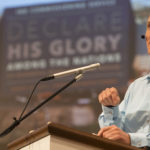NEW YORK (ABP) – Southern Baptists who question Gov. Mitt Romney’s Christianity have more in common with Mormonism than they know, Yale literary critic and author Harold Bloom opined in a New York Times commentary Nov.12.
Under an op-ed headline “Will This Election Be the Mormon Breakthrough?" Bloom agreed that Mormonism as envisioned by founding prophet Joseph Smith “was as much a departure from historical Christianity as Islam was and is.”
“But then, so in fact are most manifestations of what is now called religion in the United States, including the Southern Baptist Convention, the Assemblies of God Pentecostalists and even our mainline Protestant denominations,” Bloom continued.
Bloom revisited assertions from his influential 1992 book The American Religion: The Emergence of the Post-Christian Nation, which argued that the central religious experience on the American continent has been European Christianity in name only.
Bloom identified the Church of Jesus Christ, Latter-day Saints and the Southern Baptist Convention as the two best expressions of an American religion distinguished by an elevation of a personal and individual experience of God.
While most Baptists in the United States trace their historic roots to Europe 400 years ago, Bloom contended that Southern Baptists emerged as a distinctly American tradition in the early 20th century with theologian E.Y. Mullins, president of Southern Baptist Theological Seminary, in his Axioms of Religion.
While Mormons believe they can become gods, Bloom said, Mullins’ teaching of soul competency places God within, where no one can come between the individual and God.
Bloom said Mormon and Southern Baptist religions are both “fundamentally experiential religions” closer to Gnosticism — an early heretical teaching that each individual possesses a divine spark and salvation consists of liberation of that divine spark from the body and culture of the day — than to historic Christianity.
“Unlike most countries, we have no overt national religion; but a partly concealed one has been developing among us for two centuries now,” Bloom wrote in The American Religion. “It is almost purely experiential, and despite its insistences [to the contrary], it is scarcely Christian in any traditional way. A religion of the self burgeons, under many names, and seeks to know its own inwardness, in isolation. What the American self has found, since about 1800, is its own freedom — from the world, from time, from other selves.”
Sign up for our weekly edition and get all our headlines in your inbox on Thursdays
“A religion of the self is not likely to be a religion of peace,” Bloom observed, “since the American self tends to define itself through its war against otherness.”
Referencing recent comments in the New York Times piece by First Church, Dallas, Pastor Robert Jeffress describing Mormonism as a non-Christian cult, Bloom recalled prophesying in 1992 that by 2020 Mormonism would become the dominant religion in the western United States. He said he went wrong because he did not anticipate in the last two decades “the deliberate dwindling of the Church of Jesus Christ of Latter-day Saints into just one more Protestant sect.” Without that change, he said, Romney and fellow Mormon Jon Huntsman could not be considered plausible candidates for president.
As for his preference, Bloom, who is Jewish, observed: “Mormonism’s best inheritance from Joseph Smith was his passion for education, hardly evident in the anti-intellectual and semi-literate Southern Baptist Convention. I wonder though which is more dangerous, a knowledge-hungry religious zealotry or a proudly stupid one? Either way we are condemned to remain a plutocracy and oligarchy. I can be forgiven for dreading a further strengthening of theocracy in that powerful brew.”
–Bob Allen is managing editor of Associated Baptist Press.














We seek to connect God’s story and God’s people around the world. To learn more about God’s story, click here.
Send comments and feedback to Eric Black, our editor. For comments to be published, please specify “letter to the editor.” Maximum length for publication is 300 words.